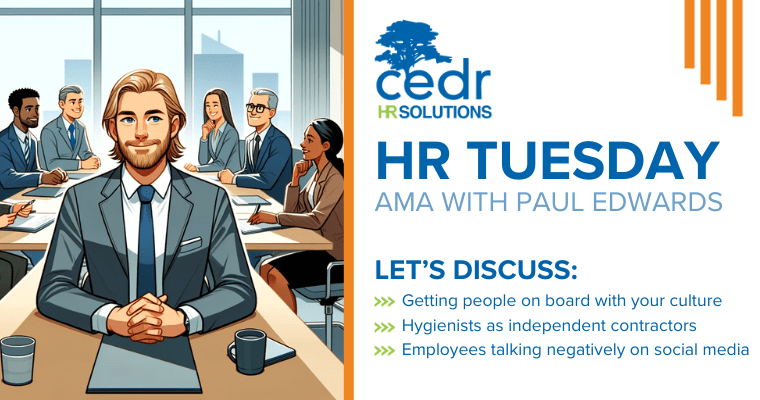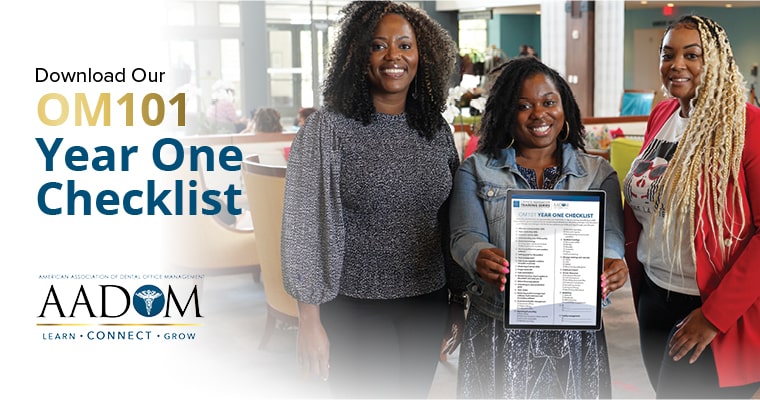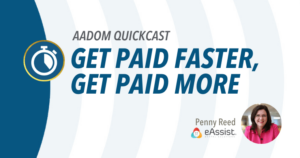LorieLou Webinar Series: Behind the Smile – The Crucial Role of the Dental Office Manager
Get ready to delve into the heart of dental practice success with Dr. Lou Shuman and Lorie Streeter. During this unique opportunity, we’ll uncover the invaluable leadership of dental office managers and the pivotal roles they play.
Dr. Shuman will share lessons he’s learned from his vast experience working with many practices across the country and why he’s convinced that recognizing the significance of the office manager’s leadership is key for every dentist/owner.
Be sure to watch our video now or read the transcript below to learn more about why a dental manager’s role plays such a key part in the success of a dental practice!
Read the Transcript:
John: What’s going on everybody? It’s John Stamper and we’re excited for you to join us today.
And I am very honored and privileged to have with me two individuals that are going to spend a little bit of time with you talking about, not only the role of the office manager, but the impact that it has had in the dental practice, as well as in dentistry in general.
I am very excited to have with me, Lorie Streeter, who’s the vice president at AADOM, and Dr. Lou Shuman, who is the founder of Cellerant Consulting. Having both of you here is amazing!
Today, Lorie will get into some of the invaluable leadership lessons of a dental office manager, and Lou’s going to share his insights into how the office manager has helped him over the years.
It’s good to see you. How are you doing?
Lou: Awesome! It is such an honor to be able to spend some time with you and Lorie. This is very special.
Lorie: Yeah, I agree. It’s nice to see you, John and Lou.
John: Lori, I’m going to turn it over to you to start this conversation. I think you want to go with having Lou share his experience and just talk about the office manager role in general.
Lorie: Thanks, John. Hello, AADOM Nation!
Lou, I’m so excited to be here with you. I think it’s in my best interest to just imagine that you and I are having one of our great conversations. We’ll let everybody peek into what one of those might look like.
Let me start by saying that I’ve been with AADOM for the last 17 years and in dentistry for 35. And Lou told me earlier today that he knows I started when I was four, so we’ll just go with that.
But, more than that, as a former office manager, I can tell you that my conversations with Lou have been very insightful.
It was the first time I really had the most in-depth conversation with a dentist where I felt like, “Oh, my gosh! This person gets every AADOM member.”
And all I can say before I turn it over to you, Lou, to tell some of my favorite stories is that I’m going to call today: Paula—it’s all about Paula.
We know from an AADOM perspective how important the dental office manager is to a practice, but I really would love it if you would share some of the ways that you know that, what that has been like through the years, and what you’ve experienced.
Lou: Great to be here. It’s my pleasure.
Well, it goes way back to when I was also four years old.
I had a former life. I was an orthodontist, and I dreamed of creating a group practice. And that’s what I was able to do.
How the Dental Journey Began
I still remember walking into the space. It was just four walls with nothing else there.
And my first hire was—I don’t like the title “office manager.” I’ve told you that before.
I feel that the person who is in charge of the practice has—in my world, I always call Paula—an operations manager. That’s because they are not just in charge of the office, but truly in charge of the operations of the whole business.
And, we sat there—I still remember looking at four walls and saying, “Okay, let’s get out the paint. We’re gonna paint it first.”
We took those four walls and ultimately turned it into a 10-doctor, 25-team-member group practice.
And it was very special. It was an incredible 10 years. She wasn’t my operations manager—she was my partner. And it was amazing!
The importance and level of impact that she provided—let me give you an idea of it.
Why Having an Operations Manager is Vital
When we started to become more mature, I had my hobby—my passion is soccer. I played for a national team when I was 18. I went on to play in Europe and other places.
My passion was coaching at that time. I was coaching the high school women’s varsity team. So, I would leave early during the week to do that.
My partner, Steve Bader, was like a crazy, enthusiastic driver where he’d take his car on tracks a hundred miles an hour. Paula and I used to pray that he’d show up at the office on Monday morning and that he was still alive.
After a number of years, Paula came to me and said, “You know, you’ve got your hobby—that’s soccer. Steve’s got his hobby, which is enthusiast driving. Could I have a hobby, too?”
I said, “Of course, after everything you’ve done. What do you wanna do?”
She said, “I’d like to leave the office one afternoon each week. I would love to learn how to go horseback riding and learn how to ride a horse.”
So she went and learned how to ride a horse. Of course, to do that, you need to rent a horse. And after a year or so, she came to me and said, “Listen, I’m going to be in a competition. Would you like to watch me compete?”
And I said, “Of course, I would love to. How close are you to that horse you’ve been using for the last year?”
She said, “Oh, my God. I love my horse.”
I said, “That’s great!”
The competition was about a week later.
When we went to the horse competition, and we went to the stall together, there was a big pink ribbon around the horse. I bought her that horse as a way of saying thank you for the 10 years that she had given us. That’s how important I think the role of operations manager is!
The office wouldn’t be where it was—the growth from the four walls to the 10-doctor, 25-team-member group, all attributed to her.
We had 25 team members when we were at full capacity. And as I always say, we lost 17 of them. And when I am on the podium saying that, the whole audience goes, “Oh no!”
Then I’d say, “No, you don’t understand. They came back after they had their babies.
We were blessed to have no turnover. And she was the reason why.
Lorie: That’s amazing! I have a question for you.
Lou: Yeah, go ahead.
Lorie: So, for anyone listening, whether you are an office manager or a dentist: How did you get to a place of trust where you felt like empowering Paula to do her job and helping your practice grow was important?
I know there are a lot of dentists who will be listening, saying, ”Oh, I don’t know. That’s really my role.”
I’m really curious. I mean, first of all, I loved my first dentist—he did not buy me a horse.
But the fact that, number one, she empowered both of you to have your hobbies and your loves just generates so much enthusiasm. I would think for a dentist to say, ”Oh my gosh, here’s somebody who doesn’t own the business but is so committed that she’s gonna help me figure out a way I can go seek my passion.”
And then you helped her with hers. I mean, that’s one of my favorite stories.
So, how would you advise a dentist to allow an operations manager to do their job to the point that it affects their practice the way that you did?
Letting Go of the Reins: Giving Your Office Manager the Power to Thrive
Lou: I’ll put it in a few words:
We didn’t have two owners at the practice. We had three. It was me, Steve, and Paula.
And the word that’s critical to anyone who’s listening is ownership mentality. Paula ran the office as an owner, and she was treated that way.
The other thing that was really important culturally in our office was that everyone was treated equally. There was no hierarchy. The dentist wasn’t put on a platform. The part-time front desk night receptionist was treated exactly the same as one of the dentists in the office.
We all learn from each other, and everyone has something that they can teach each other, no matter where they come from or what their background is.
We learned from each other. There was no hierarchy. That was very important. Everybody was comfortable in being able to talk honestly about the office. That was key.
One of the things that I think was also a benefit in the office is that—I’ve seen this in offices that haven’t had this opportunity—you just don’t bring in someone new and say, “This is how you do your job, and welcome aboard.”
Really, what we always did is we would bring someone— be it, you know, a hygienist and assistant front desk, anybody—and we’d go, “Listen, here’s how we work. Let’s do this together for the first month. And then, based on your experience, tell us how we can be better.”
So, we would want to bring in the experience of the teams that we would bring in and let them learn our system instead of going, “This is just how you do it, thank you very much.”
We’d bring a hygienist with 15 years of experience or a receptionist with 15 years of experience. And it’s not like, “Here’s our way.”
It’s more like, “This is our way for now. And then, after you’ve learned how we do it, teach us how to be better.”
So, culture is critical. Respect is even more critical. And the comfort of being able to speak your mind based on what you’re experiencing day to day.
The other thing for the dentist is that I don’t believe you manage out of an operatory. I used to call that knee-jerk management.
The practitioner’s job is to treat the patient and to give the operations manager the freedom to run the practice.
Now, am I part of the team as the practitioner? Yes!
And would I meet with the operations manager all the time? Yes!
In our practice, Steve, my partner, ran clinical, and Paula and I ran the business side. And we would brainstorm. We would brainstorm every day.
I used to go to meetings, be with my dental peers, and go, “How are things going in the practice?”
And they’re going, “Well, we’re very nervous because we’re not there.”
And I went, “Well, I’m not nervous at all.”
And they’d go, “Why are you not nervous?”
Then I’d say, “ Because I’ve cross-trained my team. They know how to run the practice without me. And I give them the respect, and they have the capabilities to do that.”
So, that was when I was on my journey and became the president of Pride Institute. It was our job to practice-manage and work with many different offices. And sure, you get exposed to everybody.
I’m sure the operations managers that are listening to this, and they’re sitting there going, “Yes” and “No,” based on some of the things of what we think are the ideal ways that they should be treated and the independence and capabilities they should be given that freedom to be able to do that in working as a team member.
We always looked at Paula as a partner. There were three of us, not two of us.
Lorie: Let me ask you a question about that, Lou.
So, I’m thinking of all the office managers I’ve met over the years, and there are some dentists that—I don’t know about to your level of giving of that title of like a partner—but if an office manager is listening or an operations manager, and they don’t maybe feel like they have that full commitment from their dentist, like you’re talking about, how would you suggest the office manager have that conversation with the dentist?
Or what would you like to say to a dentist about how they can utilize their office manager?
How to Help a Dentist See the Need to Trust Their Office Manager
Lou: Well, most of the dentists that I have as friends that I worked with at Pride, etc., none of us, for the most part, got our MBA in operations management. You go from dental school into practice.
So, it’s important that the operations manager makes the dentist aware of where they feel comfortable and what they feel they’re capable of doing.
And if they feel that there are areas they need to learn, one of the things that we did is we paid for our team’s education to be able to grow as well. They could take courses in order to be able to better themselves, and that everybody in the office was dual-trained.
So, then we had a person who could take Paula’s place if Paula was on vacation or went to a meeting.
And, so, cross-function was critical.
And if I’m that office manager, I know it’s not an easy thing to do, but you need to be direct with your doctor and make them aware.
I mean, how many times have you gone into an office and realized that there are people who have more capability than they’re being given the opportunity to provide?
Lorie: All the time.
Lou: So, the honesty of being able to communicate that and not being fearful of that is very important.
Most dentists want to have someone who can have that capability. They just might not have the experience in how to be able to expand that opportunity to the level that is provided.
It really comes down to the dentist understanding that everyone has something to teach you as the practitioner—be it your assistant, office manager, or dental hygienist. If you create an environment that allows everyone to bring their experience to the office and to be able to be honest about how they feel about how the office can grow, then that’s the type of dentist that they’ll want to have as a friend.
Lorie: Yeah, absolutely!
How AADOM Can Help Dental Operation Managers
And what’s so interesting is that when you were talking about the need to invest in learning and growing—just a shameless plug for AADOM—that’s what we’re all about, right?
We provide education for office managers all across the country.
And can you believe there are actually dentists out there who won’t pay the $199 a year to help their team?
I mean, that’s like Starbucks, right? At the end of the day, it’s like throwing down $20 on McDonald’s.
It’s crazy to me that an office manager can still come to us and say, “My dentist is making me pay for my membership to AADOM.
So, what would you say to dentists who are wondering, “Should I educate my office manager?”
What does that look like? I mean, to me, this is a no-brainer, but I still hear this all the time.
Lou: Well, I’m curious to know: Does AADOM have courses to teach the dentist about the importance of the role of the operations manager and to be able to look at the level of responsibilities that they can provide?
Lorie: No, but would you teach it? I’m asking right now. I think Lou Shuman needs to teach that class. We’ll put it up, and I’m holding you to that, Lou. I got it on camera.
View Types of AADOM Memberships
Why Dentists Should Allow Office Managers to Educate Themselves with AADOM
Lou: Well, the office manager and the dentist need to work together and learn together.
If I were integrated with AADOM, I’d want to see courses for the dentist to understand the role of the operations manager. So, maybe they’ll let go, and they’ll have a better understanding of what that role provides.
I mean, God bless Paula. The management issues she was dealing with—we had 25 team members. This is not managing a dental office. This is managing a multimillion-dollar business.
And that’s what you’re asking your o operations manager to do. So, it’s not just about filling the schedule. There’s such respect for the level of responsibility that an office manager has to take on—and just dealing with the people side of it—to be able to run it.
The thing for Paula—and that is why I just love what you’re all doing—is she didn’t have anywhere to go at that time. There was a hygiene association, there was a dental association, but there was not a dental manager association.
I know that you have a large following, and deservedly so. And if it’s 10,000, it should be 100,000, to be honest.
Lorie: I appreciate that.
And here’s the thing, Lou, and I think for everybody that’s listening or watching: One of our goals in many conversations I’ve had with Lou is, “Other people should hear us talk like this.”
Like, this is such an important conversation. I mean, look at just that one thing that you said.
I’m like, “Oh, we’ve got a new course at AADOM. It’s going to happen. I mean, that makes total sense because it’s so often that we go into practices, and people say, “I don’t even know what AADOM is.”
Yet, when people know what AADOM is, they’re like, “I can’t even believe you don’t know what it is?”
And, again, I don’t think that that’s you stating that, just like me, when I was a dental office manager, there was no AADOM. I couldn’t talk to my fellow office managers across the country and get answers and all the things that we are privy to now.
If we could just take the mindset that you started with when you hired Paula and transition that where an office manager, practice administrator, or operations manager felt that empowerment, I can only imagine the esteem that would happen between the doctor and the office manager.
And Lou, I forgot to tell you this a long time ago. Do you know that one of my first articles that was ever published when I first started working for AADOM was how to have a great relationship with your dentist. And I still hold that philosophy.
And, although you and I could talk forever and ever and ever, I do have one more story that I’m hoping you will share with everyone.
And then, just so everybody knows, if you guys all enjoy this—I mean, Lou and I would like to talk here and there and bring some really kind of couch conversation. I know, Lou, your guitar is behind you. I don’t think we’re gonna sing today, but you know, there’s always that in the future. I think “You’ve Got a Friend” by James Taylor would be my first one because of our experience together.
Lou: He’s my mentor. You know that.
Lorie: Yeah, for sure. Mine too. He’s my favorite.
So, here’s the story I’d love for you to tell because it’s one of my favorites. Well, Paula’s story is my favorite, of course. And I have very high esteem for Paula, even though I’ve never met her. So, the story about how you got a call when this office manager called you and said, “Our associate is driving us crazy. What are we gonna do with this situation?”
So, as we close up this first LorieLou, episode 1, if you could leave us with that story and what you did and the integral role the staff played and what the outcome was, I would be thrilled for everybody to hear it.
Lou: Absolutely. I do wanna make one point based on wrapping up this part before I get to the story, which is one of the things that’s really important.
I know there’s gonna be some people listening to this that, now that you have this wonderful association, the things that the managers are gonna learn and grow, the question is, “Is it a challenge for them to go back to the office?
Is that dentist going to listen, learn, and allow the manager to grow?
I hope the answer is yes.
That’s why I’m saying some of what I’d like to see with AADOM is bringing the dentist in because I’m sure that of everything that the pearls they get from the association, is it a challenge for them to be able to adopt them when they get back? Does that give them the freedom?
Lorie: That’s such a great point, Lou. And I can tell you that, after the AADOM conference, we ask and encourage everyone who attends.
We do have a lot of dentists that attend, but mostly the team, right?
So when the office manager or practice administrator goes back to their practice, we have them take a detailed note. We give them ideas on how to approach these things with the dentist.
It’s so interesting that even on our website—we’re almost sold out, which is great for this year—we have a little thing in there that says, “Would you like to show your dentist how your time at the conference is going provide a strong ROI for their practice?”
And so we actually have a letter that they can detail with all the classes they take just to try to execute that relational conversation.
But you brought up such a great point. We really need to start educating dentists on why the office manager should have this level of experience and knowledge.
Lou: Well, one of the things we did in my office, and I did this in other offices—we’ll see if the dentists would agree to this—we used to rate all our members. This team got used to answering questions about the doctors.
It was a survey and it it literally broke down what it was like working with the doctors, and also the doctors with the team. And then, after that was all done, we would collate all the answers so that the doctor wouldn’t know the person that it came from and the team wouldn’t know which doctor it came from.
So, we would then put together a document that said, here’s how you did. Here’s what’s going well, and here’s what seems like where you need to improve.
And we would do that for the whole office so that the doctors would find out—this is what I mean by everyone’s treated equally—how they’re doing, if they’re doing well, where they could improve.
And then they would also then talk to the team members. And we would sit down with each one of them without them knowing individually where all that information came from.
Which is what leads me to the story.
Everyone at the Dental Office Must Work Together as One Team
When I was in practice management, I got a call from the owner of an office, and he said, “Dr. Shuman, I need you to come to the office right away today.”
And I went, “Well, I have meetings.”
And he said, “No, I need you to come right away.”
And I went, “What’s the problem?”
He said, “I need you to fire one of my doctors.”
“You need me to fire one of your doctors?” I said.
He said, “I need you to do it today.”
And I went, “Why do I need to do it today?”
He said, “Because everyone who works up front came to me this morning and said that they’re leaving permanently and they’re not coming back. My manager and my whole front desk team are all leaving. They’ve had it. So, either you have to come fire the doctor, or I’m gonna lose my whole management team and the manager.”
I went, “Oh my God. You gotta be kidding.”
He said, “No, I’m not kidding.”
I said, “Alright, I’ll come now.”
So, I canceled my meetings. I got in the car. I drove to the office. I sit down with the owners, and I said, “What’s happening?”
And he said, I’m not even gonna tell you. Bring the team and let them tell you.”
So, I said, “Okay.”
So the operations manager and the front desk receptionist came in, and I said, “Is it true that you’re all leaving?”
“Yes!”
I asked, “Today?”
“Yes!”
I said, “What’s going on?”
They said, “The associate—we’ve had it!”
I said, “Well, what does he do?”
They said, “Well, if we’re on the phone, he picks up pens and throws them at us. If he’s not immediately handled, he starts yelling at us.”
“And then he embarrasses us in front of the patients, saying that you know you must really like me as a dentist because obviously, you keep coming here while having people like these people who don’t know what they’re doing.”
And this was going on constantly to the point where they finally went to the owner dentist and said, “We’re done!”
So, I met with the whole team after they told me all of that. I said, “I have a favorite to ask.”
And they said, “What’s that?”
Can you give me one chance? Give me two weeks to try to change him. Would you do that for me?
It was close. It wasn’t an easy sell.
They said, “Okay, Dr. Shuman, we’ll give you the two weeks.”
I said, “Great.”
So I bring the doctor in, and he goes, “Hi there.”
I said, “My name’s Dr. Shuman. Nice to meet you.” And then I went, “Do you know why I’m here?”
And he goes, “No, why are you here?”
I said, “I’m here because I’ve been asked to fire you.”
He went, “What? Are you kidding me?”
I went, “No. I’m very serious. Do you have any idea the level of hurt you’ve created upfront with the manager and with the front desk?”
What do you think his answer was? “No, I had no clue. I thought I was treating them very well.”
I went, “No, they’re all leaving.” And I said, “So, the choice is them or you, and guess what? Guess who’s going to be leaving today? Not them.”
Then he started getting really upset. He was like really affected. In his own mind, he had no idea, right?
And so he said, “Is there anything I can do to turn this around?”
And I said, “Actually, there is. I asked the team if I could have two weeks to try to turn this around. And they very nicely said yes.”
And he said, “Okay, what do I need to do?”
I said, “Oh, it’s very simple. We are canceling your patients for the next two weeks and starting Monday, you’re gonna work full time at the desk.
This is what you’re gonna do:
- You’re gonna answer the phones.
- You’re gonna do the appointments.
- You’re gonna work with the patients.
You’ll be on the front desk for two weeks.”
And he did.
He worked there for two weeks, and when he was done, he sent flowers to everybody up at the front desk, took them all to lunch, and apologized and said he had no idea.
To me, not that I’m being biased, but I think the person and the team, their work upfront—that’s the toughest job of all because you are balancing so many things at once—between the patients in front of you, the phone, insurance, managing the patients coming in, coming out, the front desk, and the waiting room.
To me, it’s the toughest job at the office and one that you have to really know how to juggle so well.
So, that’s what happened. And the good news is, at least the last time I checked, he’s still there.
Lorie: Oh my gosh. I don’t know which one’s my favorite, but those are definitely by far my two favorite Lou Shuman stories.
Well, let me close with this, Lou.
First of all, it has been my honor. John Stamper introduced you and I, and we have become fast friends.
And there are so many great things about dentistry. I love every position in the practice. My best friend was our hygienist when I was an office manager, and I lost her to Lou Gehrig’s disease. It was an impactful time in my life.
I remember when I got my first big corporate job. I said that I was going to work at a DSO, and I said,” I’m not gonna be around as much.”
And she said, “You go.”
And, you know, and we lost her about a year later.
It’s profound when people take the time to really appreciate every single position in the practice. How important it is that we all work together as a team. And I love how you said everybody was treated differently. There was no real hierarchy.
To me, a lot of times, hierarchy is just simple respect for someone else’s position and you’ve done nothing but articulate that this whole half hour about how just simply trusting and allowing.
I think of clinicians as, you know, the two by two square, that they’re looking at trying to do the best dentistry. It’s very hard to do that when you don’t trust the person up front or the people up front to do their job and do their job well.
So, I hope you don’t mind, but if anybody’s watching this and doesn’t know what AADOM is: The American Association of Dental Office Management.
You can find us at dentalmanagers.com.
And, I would just say to start there because, like you, Lou, I remember being an office manager and seeing everybody go off to meetings, and I stayed behind to answer the phone because there were no classes for me.
Now we’re in a different time, right? That was a long time ago. There are lots of classes for office managers and for teams and for operations and treatment coordination.
But at the end of the day, it really does take a special understanding of what you want out of that role as a dentist.
What do you want that team to feel like when they’re upfront?
And I’d love for you to close out with just maybe some advice for a dentist who might be watching or for an office manager on how you would go about taking that first step to gain that type of understanding for that role.
What Steps Can a Dentist Take?
Lou: Well, leadership, in my opinion, is not created by title. It’s earned. And the thing is that the practitioner needs to give that operations manager the freedom to be able to create their own culture.
Our job, for the most part, is clinically to be the best we can be. Our leadership, as an owner, really has a lot to do with our clinical capabilities.
And if you’re gonna have an office that’s truly gonna grow—I mean, we went from zero to a multimillion-dollar practice because we gave the operations manager the freedom to lead.
Our specialty is treating the patients clinically and personally. It was the operations manager’s job to run the business. And if a practitioner gives the operation manager the freedom to lead and to work as a partner, hat’s the true definition of success.
Lorie: Awesome. Well, on that note, Lou, I would love for anyone listening—if you’d like more conversations between Lorie and Lou and figure out what kind of topics they’d like to hear, hit the show notes.
And make sure you reach out to us. My email is lorie@dentalmanagers.com. I’m easily accessible. We would love to hear any feedback or things you’d like to hear going forward.
Lou, I can’t thank you enough for your time. I just treasure our friendship, and you have made such a huge impact on dentistry. It has been my honor to talk to you today and all of AADOM nation to be able to hear from a great, like you. I appreciate it.
Lou: Well, listen, I’m so happy that AADOM exists, and you’re a huge reason why it does. It’s something that’s been needed for such a long time, and I’m hoping that a meeting like this will give more managers the impetus to recognize they have a hope…that AADOM is a place where they can learn and grow.
And you know, like I said, it’s really important that the practitioners recognize this. And, I’m sure there are people that are sitting there going, “That’s my practice practitioner, that’s my dentist. He gets it.
Others are going, “Let’s get a dentist operations manager meeting together so that some of the things can rub off and that dentist can recognize their importance.
So, thank you for the time. Next time we gotta talk music with everybody.
Lorie: We’ll have to talk music, and I would love to talk to you about our distinction program where office managers can earn distinctions with AADOM.
We have so much more to talk about. Let’s go for part 2.
Thank you for being with us, everyone. And goodbye to AADOM Nation.
Lou: Take care, everyone!
We hope you enjoyed reading this article. Be sure to watch our video now to see Lorie and Lou discuss the important role that an office manager plays in a dental clinic!
Learn About the Presenters:
 Lou Shuman, DMD, CAGS, is the founder and CEO of Cellerant Consulting Group, currently assisting in the growth of 27 companies and introducing new technologies into dentistry from all over the world. He is also Co-founder of LightForce Orthodontics the first company to create a fully customized 3D printed ceramic orthodontic bracket, and recently launched DSO Technology Solutions exposing company technologies to over 40 DSOs. Previously he was the President of Pride Institute and Vice President of Clinical Education and Strategic Relations at Align Technology.
Lou Shuman, DMD, CAGS, is the founder and CEO of Cellerant Consulting Group, currently assisting in the growth of 27 companies and introducing new technologies into dentistry from all over the world. He is also Co-founder of LightForce Orthodontics the first company to create a fully customized 3D printed ceramic orthodontic bracket, and recently launched DSO Technology Solutions exposing company technologies to over 40 DSOs. Previously he was the President of Pride Institute and Vice President of Clinical Education and Strategic Relations at Align Technology.
He was awarded the American Mobile & Teledental Alliance’s highest honor, the Denobi Pinnacle Achievement Award, which recognizes an individual whose leadership and ongoing contributions have dramatically impacted the dental profession. Going forward, the award will be named in his honor. He was also recently honored as a Global Summits Institute Doctor-to-Doctor World’s Top 100 Doctors and was recently recognized by Dental Products Report by having the 1st, 3rd, and 4th most viewed articles for all of 2023.
He has monthly national columns in Dental Economics – “Technology in Two Minutes”, Dental Products Report – “Dentistry Tomorrow”, and DSO Pro, one of dentistry’s major DSO publications.
As an orthodontist, his dream was to create a group practice ultimately having his own 10 doctor 25 team member practice for 10 years that he developed hand in hand with his operations manager from the beginning. While working at Pride he worked closely with Office Managers from all around the country.
 Lorie Streeter, CTC, has been working for The American Association of Dental Office Management, or AADOM for the past 16 years. Lorie is the Current Vice President of AADOM. Lorie’s dental career spans 34 years, 12 of which were spent as a dental office manager. Lorie received her certification as a Therapeutic Coach and has spent the last 10 years coaching clients to emotional and physical wellness.
Lorie Streeter, CTC, has been working for The American Association of Dental Office Management, or AADOM for the past 16 years. Lorie is the Current Vice President of AADOM. Lorie’s dental career spans 34 years, 12 of which were spent as a dental office manager. Lorie received her certification as a Therapeutic Coach and has spent the last 10 years coaching clients to emotional and physical wellness.
Lorie has been speaking to large and small groups educating dental professionals on everything from the Benefits of AADOM, Marketing a Dental Practice, and how to keep you and your teams healthy and motivated. Lorie is dedicated to the growth and development of all teams. Lorie serves on the AADOM advisory council, AADOM Executive team, and the AADOM Distinctions Board. In 2015 Lorie was recognized as one of the top 25 Women in Dentistry by Dental Products Report magazine.






